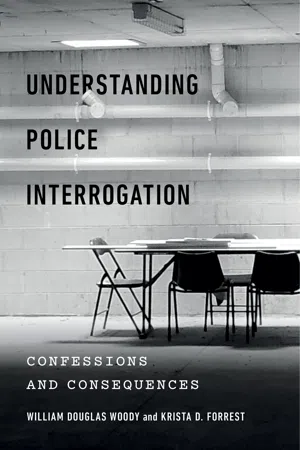
Understanding Police Interrogation
Confessions and Consequences
- English
- ePUB (mobile friendly)
- Available on iOS & Android
Understanding Police Interrogation
Confessions and Consequences
About this book
Uses techniques from psychological science and legal theory to explore police interrogation in the United States
Understanding Police Interrogation provides a single comprehensive source for understanding issues relating to police interrogation and confession. It sheds light on the range of factors that may influence the outcome of the interrogation of a suspect, which ones make it more likely that a person will confess, and which may also inadvertently lead to false confessions.
There is a significant psychological component to police interrogations, as interrogators may try to build rapport with the suspect, or trick them into thinking there is evidence against them that does not exist. Also important is the extent to which the interrogator is convinced of the suspect's guilt, a factor that has clear ramifications for today's debates over treatment of black suspects and other people of color in the criminal justice system.
The volume employs a totality of the circumstances approach, arguing that a number of integrated factors, such as the characteristics of the suspect, the characteristics of the interrogators, interrogation techniques and location, community perceptions of law enforcement, and expectations for jurors and judges, all contribute to the nature of interrogations and the outcomes and perceptions of the criminal justice system. The authors argue that by drawing on this approach we can better explain the likelihood of interrogation outcomes, including true and false confessions, and provide both scholars and practitioners with a greater understanding of best practices going forward.
Frequently asked questions
- Essential is ideal for learners and professionals who enjoy exploring a wide range of subjects. Access the Essential Library with 800,000+ trusted titles and best-sellers across business, personal growth, and the humanities. Includes unlimited reading time and Standard Read Aloud voice.
- Complete: Perfect for advanced learners and researchers needing full, unrestricted access. Unlock 1.4M+ books across hundreds of subjects, including academic and specialized titles. The Complete Plan also includes advanced features like Premium Read Aloud and Research Assistant.
Please note we cannot support devices running on iOS 13 and Android 7 or earlier. Learn more about using the app.
Information
Table of contents
- Cover
- Series Page
- Title Page
- Copyright
- Dedication
- Contents
- Foreword
- Introduction
- 1. Historical Developments in Policing and the Practice of Interrogation: The Emergence of Civilian Policing
- 2. The Current Nature of Police Interrogation
- 3. Deceptive Interrogation Tactics
- 4. False Confessions and Their Causes
- 5. Costs and Consequences of Deception, Coercion, and False Confessions
- 6. Expert Testimony
- 7. Safeguards
- Conclusions and Recommendations
- Acknowledgments
- Notes
- References
- Index
- About the Authors